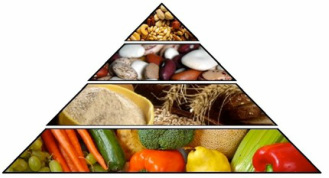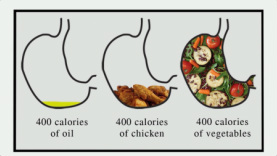What is Plant-based Nutrition?
Plant-based nutrition is the science of obtaining all essential nutrients required for maintaining optimal human health from plant foods! Pound for pound, plant are the most nutritionally dense foods available for human consumption, packaged with a wide variety of macronutrients (carbohydrates, proteins, fats), vitamins, minerals, fiber, water, and antioxidants. Contrary to popular belief, all of the essential amino acids and essential fatty acids can be found in a caloric sufficient plant-based diet. Plant-based nutrients are also the most easily digested, absorbed, assimilated, and eliminated nutrients for the human body to process. When consumed in the appropriate caloric ratios, all human nutrition needs can be met, and exceeded following a plant-based diet.

What is a Plant-based Diet?
A plant-based diet is a diet composed 80-100% of plant foods. These foods consist of fruits, vegetables, whole grains, beans/legumes, and nuts/seeds; consumed in whole form and minimally processed. In a plant-based diet, plant foods comprise the majority of calories consumed which ensures adequate nutrient intake while decreasing the intake of harmful food substances (cholesterol, saturated fat, heterocyclic amines, fragmented sodium chloride, chemicals, preservatives/additives, IGF-1, etc), which are mainly found in animal products and processed foods. Since most plant-based foods are naturally low in calories, a higher volume needs to be consumed to ensure adequate calorie and nutrient intake.
A plant-based diet is a diet composed 80-100% of plant foods. These foods consist of fruits, vegetables, whole grains, beans/legumes, and nuts/seeds; consumed in whole form and minimally processed. In a plant-based diet, plant foods comprise the majority of calories consumed which ensures adequate nutrient intake while decreasing the intake of harmful food substances (cholesterol, saturated fat, heterocyclic amines, fragmented sodium chloride, chemicals, preservatives/additives, IGF-1, etc), which are mainly found in animal products and processed foods. Since most plant-based foods are naturally low in calories, a higher volume needs to be consumed to ensure adequate calorie and nutrient intake.

Plant-based Diet vs. Standard American Diet
Compared to the Standard American Diet (SAD), a plant-based diet is lower in calories, fat, and protein and is higher in carbohydrates, fiber, water, and nutrients.
Perhaps the most significance difference between the two diets is the difference in total macronutrient ratios (carbs/fat/protein), which have a dramatic effect on body weight and overall health. The SAD is typically loaded with animal products and processed foods high in fat, protein, cholesterol, salt, and chemicals, placing an individual at risk for developing chronic illnesses such as heart disease, obesity, cancer, diabetes, hormonal disorders, autoimmune diseases, etc. On a plant-based diet, an individual actually gets to consume more food and calories than on the SAD due to the decreased intake of fat, protein, cholesterol, and other harmful substances while filling up on fiber-rich, nutrient dense plant foods. A high carbohydrate, low fat, plant-based diet sufficient in calories will allow an individual (overtime) to achieve and maintain optimal health, a high metabolism, and ideal body weight effortlessly!
Impact on Health and Disease
Plant-based nutrition is now at the forefront of preventative health care, and is proving to be the most effective treatment for chronic illnesses (heart disease, diabetes, cancer, obesity, hypothyroidism, etc) as well as weight management. The immense nutritional benefits provided by a plant-based diet combined with the decreased intake of harmful substances, creates an internal environment conducive of healing and nutritional balance (see Coaching). As a growing number of research studies and personal trials continue to emerge, many physicians (see Resources) support, promote, and have confirmed that a plant-based diet is the secret to achieving and maintaining optimal health for life.
If you have any questions/comments/concerns or would like some help getting started with your own plant-based diet, please leave a comment below or feel free to Contact me!!
Thanks for reading :)
Victoria
Compared to the Standard American Diet (SAD), a plant-based diet is lower in calories, fat, and protein and is higher in carbohydrates, fiber, water, and nutrients.
Perhaps the most significance difference between the two diets is the difference in total macronutrient ratios (carbs/fat/protein), which have a dramatic effect on body weight and overall health. The SAD is typically loaded with animal products and processed foods high in fat, protein, cholesterol, salt, and chemicals, placing an individual at risk for developing chronic illnesses such as heart disease, obesity, cancer, diabetes, hormonal disorders, autoimmune diseases, etc. On a plant-based diet, an individual actually gets to consume more food and calories than on the SAD due to the decreased intake of fat, protein, cholesterol, and other harmful substances while filling up on fiber-rich, nutrient dense plant foods. A high carbohydrate, low fat, plant-based diet sufficient in calories will allow an individual (overtime) to achieve and maintain optimal health, a high metabolism, and ideal body weight effortlessly!
Impact on Health and Disease
Plant-based nutrition is now at the forefront of preventative health care, and is proving to be the most effective treatment for chronic illnesses (heart disease, diabetes, cancer, obesity, hypothyroidism, etc) as well as weight management. The immense nutritional benefits provided by a plant-based diet combined with the decreased intake of harmful substances, creates an internal environment conducive of healing and nutritional balance (see Coaching). As a growing number of research studies and personal trials continue to emerge, many physicians (see Resources) support, promote, and have confirmed that a plant-based diet is the secret to achieving and maintaining optimal health for life.
If you have any questions/comments/concerns or would like some help getting started with your own plant-based diet, please leave a comment below or feel free to Contact me!!
Thanks for reading :)
Victoria
 RSS Feed
RSS Feed
